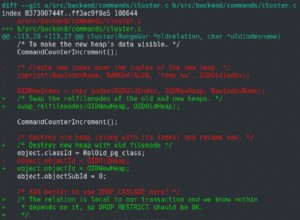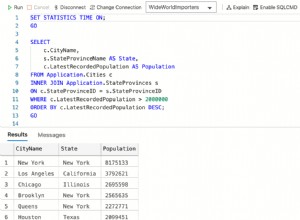No MariaDB, podemos usar o
SHOW PROCEDURE STATUS comando para retornar uma lista de procedimentos armazenados. Também podemos consultar o
information_schema.routines mesa para fazer a mesma coisa. O SHOW PROCEDURE STATUS Comando
A maneira mais fácil de listar todos os procedimentos armazenados é usar o
SHOW PROCEDURE STATUS comando. Basta executar o seguinte para listar todos os procedimentos armazenados:
SHOW PROCEDURE STATUS;A sintaxe fica assim:
SHOW PROCEDURE STATUS
[LIKE 'pattern' | WHERE expr]Então você pode usar um
LIKE cláusula ou WHERE cláusula para restringir os resultados. Exemplo:
SHOW PROCEDURE STATUS LIKE 'film%';Resultado:
+--------+-------------------+-----------+------------------+---------------------+---------------------+---------------+---------+----------------------+----------------------+--------------------+ | Db | Name | Type | Definer | Modified | Created | Security_type | Comment | character_set_client | collation_connection | Database Collation | +--------+-------------------+-----------+------------------+---------------------+---------------------+---------------+---------+----------------------+----------------------+--------------------+ | sakila | film_in_stock | PROCEDURE | example@sqldat.com | 2021-11-13 07:26:47 | 2021-11-13 07:26:47 | DEFINER | | utf8mb4 | utf8mb4_general_ci | utf8mb4_general_ci | | sakila | film_not_in_stock | PROCEDURE | example@sqldat.com | 2021-11-13 07:26:47 | 2021-11-13 07:26:47 | DEFINER | | utf8mb4 | utf8mb4_general_ci | utf8mb4_general_ci | +--------+-------------------+-----------+------------------+---------------------+---------------------+---------------+---------+----------------------+----------------------+--------------------+
O information_schema.routines Tabela
Outra maneira de obter uma lista de procedimentos armazenados é consultar o
information_schema.routines tabela. Exemplo:
SELECT
routine_schema as "Database",
routine_name
FROM
information_schema.routines
WHERE
routine_type = 'PROCEDURE'
ORDER BY
routine_schema ASC,
routine_name ASC;Resultado:
+----------+--------------------+ | Database | routine_name | +----------+--------------------+ | mysql | AddGeometryColumn | | mysql | DropGeometryColumn | | pethouse | spGetAllPets | | pethouse | spGetPetById | | sakila | film_in_stock | | sakila | film_not_in_stock | | sakila | rewards_report | +----------+--------------------+
Esta tabela também armazena informações sobre funções armazenadas. No exemplo acima, excluí aqueles usando um
WHERE cláusula para retornar apenas procedimentos armazenados (ou seja, objetos com um routine_type de PROCEDURE ). Para incluir funções armazenadas, podemos remover o
WHERE cláusula:SELECT
routine_schema as "Database",
routine_name,
routine_type
FROM
information_schema.routines
ORDER BY
routine_schema ASC,
routine_name ASC;Resultado:
+----------+----------------------------+--------------+ | Database | routine_name | routine_type | +----------+----------------------------+--------------+ | mysql | AddGeometryColumn | PROCEDURE | | mysql | DropGeometryColumn | PROCEDURE | | pethouse | spGetAllPets | PROCEDURE | | pethouse | spGetPetById | PROCEDURE | | sakila | film_in_stock | PROCEDURE | | sakila | film_not_in_stock | PROCEDURE | | sakila | get_customer_balance | FUNCTION | | sakila | inventory_held_by_customer | FUNCTION | | sakila | inventory_in_stock | FUNCTION | | sakila | rewards_report | PROCEDURE | +----------+----------------------------+--------------+
Neste caso eu também adicionei o
routine_type coluna para que possamos distinguir entre os procedimentos e funções. Também podemos excluir determinados bancos de dados do resultado se quisermos:
SELECT
routine_schema as "Database",
routine_name,
routine_type
FROM
information_schema.routines
WHERE
routine_schema NOT IN ('sys', 'information_schema', 'mysql', 'performance_schema')
ORDER BY
routine_schema ASC,
routine_name ASC;Resultado:
+----------+----------------------------+--------------+ | Database | routine_name | routine_type | +----------+----------------------------+--------------+ | pethouse | spGetAllPets | PROCEDURE | | pethouse | spGetPetById | PROCEDURE | | sakila | film_in_stock | PROCEDURE | | sakila | film_not_in_stock | PROCEDURE | | sakila | get_customer_balance | FUNCTION | | sakila | inventory_held_by_customer | FUNCTION | | sakila | inventory_in_stock | FUNCTION | | sakila | rewards_report | PROCEDURE | +----------+----------------------------+--------------+
Ou podemos reduzi-lo a um determinado banco de dados:
SELECT
routine_schema as "Database",
routine_name,
routine_type
FROM
information_schema.routines
WHERE
routine_schema = 'pethouse'
ORDER BY
routine_name ASC;Resultado:
+----------+--------------+--------------+ | Database | routine_name | routine_type | +----------+--------------+--------------+ | pethouse | spGetAllPets | PROCEDURE | | pethouse | spGetPetById | PROCEDURE | +----------+--------------+--------------+




